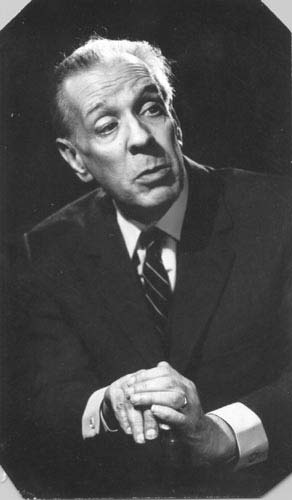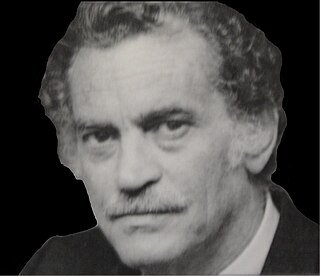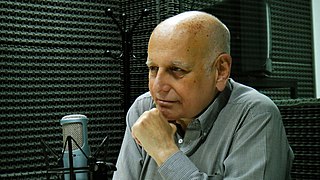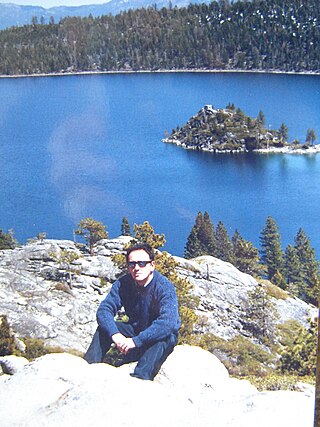Related Research Articles

Jorge Francisco Isidoro Luis Borges Acevedo was an Argentine short-story writer, essayist, poet and translator regarded as a key figure in Spanish-language and international literature. His best-known works, Ficciones (transl. Fictions) and El Aleph, published in the 1940s, are collections of short stories exploring motifs such as dreams, labyrinths, chance, infinity, archives, mirrors, fictional writers and mythology. Borges's works have contributed to philosophical literature and the fantasy genre, and have had a major influence on the magic realist movement in 20th century Latin American literature.

Adolfo Bioy Casares was an Argentine fiction writer, journalist, diarist, and translator. He was a friend and frequent collaborator with his fellow countryman Jorge Luis Borges. He is the author of the Fantastique novel The Invention of Morel.
H. Bustos Domecq is a pseudonym used for several collaborative works by the Argentine writers Jorge Luis Borges and Adolfo Bioy Casares.
"The Lottery in Babylon" is a fantasy short story by Argentine writer Jorge Luis Borges. It first appeared in 1941 in the literary magazine Sur, and was then included in the 1941 collection The Garden of Forking Paths, which in turn became the part one of Ficciones (1944). Translated into English by John M. Fein, it was published in Prairie Schooner, Fall 1959, and in Labyrinths.

Ficciones is a collection of short stories by Argentine writer and poet Jorge Luis Borges, originally written and published in Spanish between 1941 and 1956. Thirteen stories from Ficciones were first published by New Directions in the English-language anthology Labyrinths (1962). In the same year, Grove Press published the entirety of the book in English using the same title as in the original language. "The Approach to Al-Mu'tasim" originally appeared published in A History of Eternity (1936). Ficciones became Borges's most famous book and made him known worldwide.

Labyrinths is a collection of short stories and essays by Argentine writer and poet Jorge Luis Borges. It was translated into English, published soon after Borges won the International Publishers' Prize with Samuel Beckett.

Emir Rodríguez Monegal, born in Uruguay, was a scholar, literary critic, and editor of Latin American literature. From 1969 to 1985, Rodríguez Monegal was professor of Latin American contemporary literature at Yale University. He is usually called by his second surname Emir R. Monegal or Monegal.

This is a bibliography of works by Argentine short-story writer, essayist, poet, and translator Jorge Luis Borges (1899–1986).

"The Garden of Forking Paths" is a 1941 short story by Argentine writer and poet Jorge Luis Borges. It is the title story in the collection El jardín de senderos que se bifurcan (1941), which was republished in its entirety in Ficciones (Fictions) in 1944. It was the first of Borges's works to be translated into English by Anthony Boucher when it appeared in Ellery Queen's Mystery Magazine in August 1948. In 1958 it was translated back into English by Donald A. Yates and published in Michigan Alumnus Quarterly Review, Spring 1958. In 1962 this translation was included in the book Labyrinths.
"The Secret Miracle" is a short story by Argentine writer and poet Jorge Luis Borges. The story focuses on an author condemned to death. At the moment of his execution, time freezes, allowing him to finish his masterpiece, though only within his own mind.
"The House of Asterion" is a short story by Argentine writer Jorge Luis Borges. The story was first published in 1947 in the literary magazine Los Anales de Buenos Aires and republished in Borges's short story collection The Aleph in 1949. It is based on the Greek myth of Theseus and the Minotaur and is told from the perspective of Asterion, the Minotaur.

Fernando Sorrentino is an Argentine writer. His works have been translated into English, Portuguese, Italian, German, French, Finnish, Hungarian, Polish, Bulgarian, Chinese, Vietnamese, Tamil, Kannada, Persian and Kabyle.

Rodolfo Enrique Fogwill, who normally went only by his surname, Fogwill, was an Argentine short story writer, novelist, and businessman. He was a distant relative of the novelist Charles Langbridge Morgan. He was the author of Malvinas Requiem, one of the first narratives to deal with the Falklands War. Fogwill died on August 21, 2010, from a pulmonary dysfunction.
Manuel Peyrou was an Argentine writer and journalist.

Edgardo Cozarinsky was an Argentine writer and filmmaker. He was best known for his Spanish-language novel Vudú urbano.

The Book of Fantasy is the English translation of Antología de la literatura fantástica, an anthology of approximately 81 fantastic short stories, fragments, excerpts, and poems edited by Jorge Luis Borges, Adolfo Bioy Casares, and Silvina Ocampo. It was first published in Argentina in 1940, and revised in 1965 and 1976. Anthony Kerrigan had previously translated a similar work by the same editors, Cuentos breves y extraordinarios (1955) as Extraordinary Tales, published by Herder & Herder in 1971. The 1988 Viking Penguin edition for English-speaking countries includes a foreword by Ursula K. Le Guin.
"Death and the Compass" is a short story by Argentine writer and poet Jorge Luis Borges (1899–1986). Published in Sur in May 1942, it was included in the 1944 collection Ficciones. It was translated into English by Anthony Kerrigan and published in New Mexico Quarterly. A new translation, by Donald A. Yates, was published in Labyrinths , New Directions, 1962.

Edgar Brau is an Argentine writer, stage director and artist.

"Emma Zunz" is a short story by Argentine writer Jorge Luis Borges. The tale recounts how its eponymous heroine avenges the death of her father. Originally published in September 1948 in the magazine Sur, it was reprinted in Borges' 1949 collection The Aleph. The story deals with the themes of justice and revenge, and of right and wrong. As in several other short stories, Borges illustrates the difficulty in understanding and describing reality. The story relies on issues of deceit, self-deception and inauthenticity to illustrate this. According to what Borges wrote in the epilogue of The Aleph, the plot of this story was communicated to him by his friend Cecilia Ingenieros. It was translated into English by Donald A. Yates and published in Labyrinths.
Suzanne Jill Levine is an American writer, poet, literary translator and scholar.
References
- ↑ John Simon Guggenheim Memorial Foundation. Donald A. Yates – Awarded 2008 - Donald A. Yates – John Simon Guggenheim Memorial Foundation...
- ↑ La Nación. “El amigo americano de Borges”. November 29, 2008 - El amigo americano de Borges
- ↑ Francis M. Nevins. “First You Read, Then You Write”. Mystery File, February 2018 - » MIKE NEVINS on DONALD A. YATES (1930-2017).
- ↑ The National Endowment for the Arts. 2000 Annual Report - 2000 Annual Report
- ↑ Defensoría del Pueblo. Ciudad Autónoma de Buenos Aires. Decreto 1398. Donald Yates, Huésped de Honor. 01 de diciembre de 2009 - Ciudad y Derechos
- ↑ "Entrega de distinciones" (PDF) (in Spanish). Academia Argentina de Letras.
- ↑ "50 outstanding translations from the last 50 years". Archived from the original on December 22, 2009.
- ↑ Napa Valley Register. Donald A. Yates (1930-2017). November 12, 2017 - Donald A. Yates